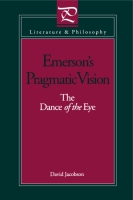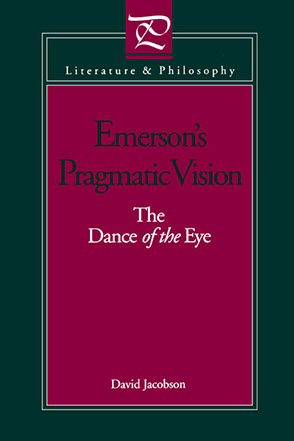Emerson's Pragmatic Vision
The Dance of the Eye
David Jacobson
“Emerson’s Pragmatic Vision is an excellent and thorough piece of reflection and scholarship. Jacobson carefully traces the transformations of Emerson’s vision and relocates the early material within the larger evolution of a naturalist perspective. He shows how ‘The Method of Nature’ marks a turning point in which Emerson moves decisively beyond his earlier humanism (with its attendant narcissism) toward a view which places the human process at the service of the much vaster and more compelling method of nature.”
- Description
- Reviews
- Bio
- Subjects
Emerson's Pragmatic Vision depicts not two Emersons but three. Between the early humanist confidence in self-reliance and the late embrace of fate, Jacobson identifies a transitional period, enunciated in the stark lecture, "The Method of Nature" (1841), and typified by the pessimism and humanist nostalgia of "Experience." The doctrine of fate, Emerson's mature pragmatic philosophy, is presented as a response to this period in which is found Emerson's retrieval of a philosophical posture rooted in obedience to the eloquence of the practice of life.
“Emerson’s Pragmatic Vision is an excellent and thorough piece of reflection and scholarship. Jacobson carefully traces the transformations of Emerson’s vision and relocates the early material within the larger evolution of a naturalist perspective. He shows how ‘The Method of Nature’ marks a turning point in which Emerson moves decisively beyond his earlier humanism (with its attendant narcissism) toward a view which places the human process at the service of the much vaster and more compelling method of nature.”
David Jacobson is Assistant Professor of English at the University of Illinois, Urbana.
Mailing List
Subscribe to our mailing list and be notified about new titles, journals and catalogs.




